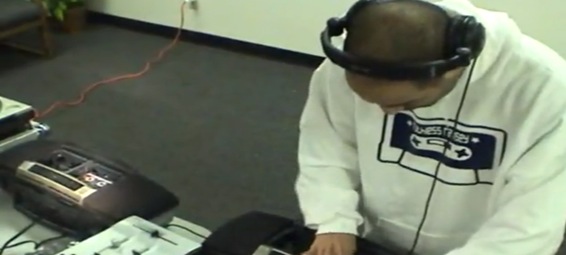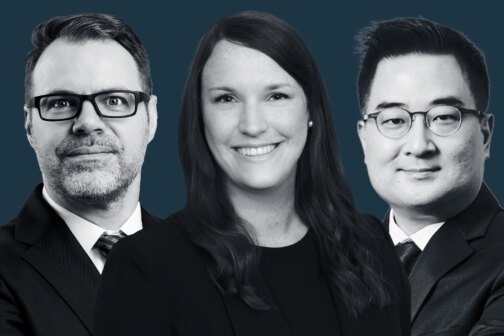Ramsey Higgins, aka “Ruthless Ramsey” is a Phoenix, AZ-based hip hop DJ whose approach to the art is profoundly unique. For starters, he mixes on cassette decks, which is not only uncommon, but it makes Ruthless Ramsey almost a complete anomaly in his chosen field. He is also extremely fluid at it, and a few online clips give cause to wonder how he is even producing some of these sounds with such ease. The short answer is that it took decades of practice. Higgins takes a scholarly approach to the genre, and he is well-versed in turntablism on actual record players as well. That’s scholarly in the literal sense, since the artist was key in founding one of the first actual accredited college courses on turntablism in the country. Ramsey will be teaching a course at South Mountain Community College in Phoenix for the 2012 Fall Semester.
I spoke with Ruthless Ramsey by phone yesterday, shortly after his arrival to Dallas for a Friday gig at Elm Street Bar. Aside from expressing his gratitude to local artist Phooka and promoter Ty Anderson for bringing him to the city, he also discussed his origins, cassette deck requirements, and his approach to hip hop in an educational environment.
FrontRow: Let’s start early: Did the original idea stem from not having access to a turntable? Or did you merely wonder why nobody thought to mix on a cassette deck?
Ruthless Ramsey: Actually it’s a combination of both. You kind of hit on the nail right there, but yeah, we couldn’t afford 1200s. We were on Section 3. We didn’t have the means. I had the idea when I was a kid. I was about seven years old and then I saw Jam Master Jay and Mix Master Ice. Those guys inspired me, along with my uncle. It started with my uncle. We didn’t have the means to do it. I couldn’t afford it.
My dad got me a double cassette player and then I had this idea. So I started putting in the practice, and used the scientific method in order to prove. That inspired the idea. The rest is history.
FR: Your uncle was a disco DJ, is that correct?
RR: Yeah, my uncle, his name is Lawrence Farah. He was a disco DJ, and he used to mix on three turntables. He used to sit me on a little stool and mix things. I would be looking at him while he was mixing, and just watch him … for hours. [laughter]
FR: How do you feel about disco now? Did it matter to you that it was disco? Were you into it at the time?
RR: That’s a big one. As a kid, I didn’t know any better. All I knew was, that was my uncle, and he was doing something that he loved to do. And he made it sound good. Some twenty-odd years later, I didn’t know I would actually be going to do a session with him, and he taught me something new. I didn’t think I would be there to learn, but yeah, he taught me something.
FR: What age did you realize this would probably set you apart from a lot of DJs?
RR: Whoa…that’s a big one. To be honest with you, and you’re probably going to laugh about this one, that didn’t settle in until about 2004.
FR: Okay, so fairly recently.
RR: Yeah, after I did a couple of tournaments, and in a couple of them, I got disqualified.
FR: You were disqualified?
RR: Yep.
FR: Because of the fact that it was a cassette.
RR: Yep. Hence the reason, why I came to the conclusion—and I spent years, perfecting, perfecting, perfecting—the cassette is an inferior device compared to either vinyl or anything else above that. Unless it’s DAT, but I haven’t really used that to my advantage, yet. The deal is, is that it’s impossible to mimic a turntable on a cassette player, to the naked eye and to what everyone normally knows. It’s impossible to do. It’s just not happening.
FR: Right…
RR: So what I did was, of course I knew I how to use 1200s, but the idea was to basically place the cassette against the turntable…opposite. I would get my reflexes to mimic as much as possible, even by means of recording. You might say, “this doesn’t sound like a cassette player,” because it doesn’t have as much of the hiss on it. I found a way to take the hiss out. After that, it was just a matter of reflexes and perfecting the patterns.
Like I told QBert, I said, “Hey, thank you.” He said, “For what?” I said, “Because if you hadn’t made the patterns, I wouldn’t have had anything to follow.” As far as scratching patterns and everything.
FR: Is there a particular brand and model of deck that you swear by?
RR: No, not right now.
FR: It could be any deck?
RR: It could be any deck, as long as it has two key points on there: Number one: They have to play at the same time. I use two of them but each cassette player is going to have to play simultaneously.
And Number two: It’s gotta have the proper rollers. Everything else is just an added piece. If the volume sticks to my pinkie finger, then yeah, I could do you faded scratches, and boomerangs, and stuff like that.
FR: You taught a course on turntablism, which was one of the first in the country. What do you feel is something that is overlooked when people teach themselves, that you would show them in the classroom?
RR: That’s a big one. Yeah, something I had to go through … I’m thankful that I had good teachers, coaches, if you will. But that doesn’t happen to everybody, so one of the things that you overlook, is reflexes. It takes a lot of time to struggle with that. Reflexes. Proper record control. Fader control. How to catch the rhythm. How big the metronome is, and how do you apply that to your physical metronome?
A lot of them don’t see the importance, they don’t see the aspect of how much of an instrument that turntable can really be, and how much coordination you have to have of the relationship between the turntable and the mixer. Or record control versus fader control. I teach you that 80 percent of cutting is record control and 20 percent is fader.
It’s at Scottsdale Community College. It’s been the leading education for DJs and turntablism over the past ten years. I wrote the competencies for the turntablism class and we’ve been having a lot of media attention, from FOX News, and USA Today, and all that. Thanks to Dr. Novak, she’s the head of the music department.
It’s fun teaching these kids. I want to make sure they have the proper foundation. Not only that, but I teach a little bit of history of how hip hop got started, and why it got started, who the pioneers are, back in ’73. It actually could go to ’69, if you want to start with Lovebug Starski. But all your Grandmaster Flashes, and Kool Hercs, and Afrika Bambaataas, we talk about them. Afrika Bambaataa, he’s been through there, he’s been through our classes. Jazzy Jeff, QBert, some of the Skratch Piklz like Shortkut, and he’s a Beat Junkie too. Z-Trip … just to name a few, they’ve been through there.
Ruthless Ramsey performs at Elm Street Bar in Dallas, on Friday, August 17. Photo via






